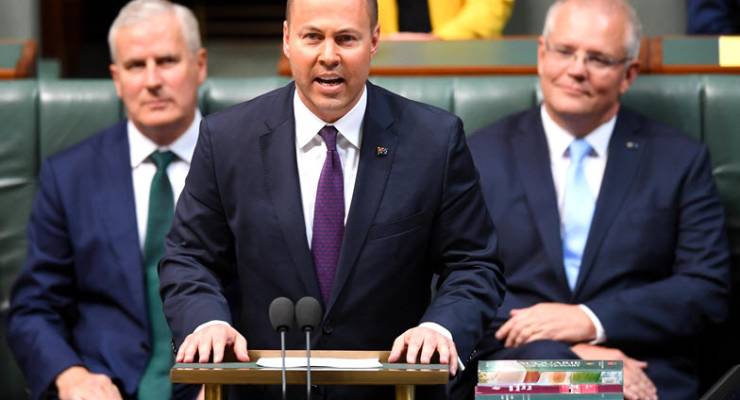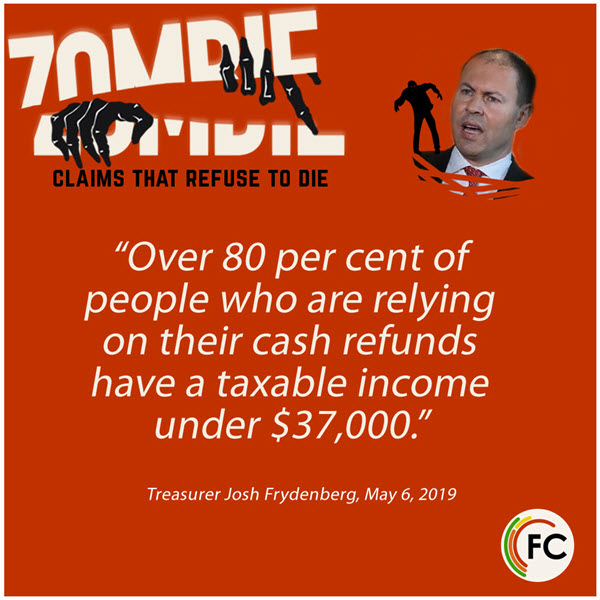
The current claim
Treasurer Josh Frydenberg has again attacked Labor over its plan to raise more than $5 billion a year by scrapping refundable franking credits on dividends from shares.
During the Treasurers’ debate at the National Press Club in Canberra, Frydenberg suggested the policy would mostly affect people on lower incomes.
“Over 80 per cent of people who are relying on their cash refunds have a taxable income under $37,000.”
Previous claims
RMIT ABC Fact Check examined a similar claim by Assistant Treasurer Stuart Robert in January that the proposal was “not fair” because it would hit the lowest paid Australians.
“Any changes will overwhelmingly hit low and middle-income earners, with 84 per cent of the individuals impacted on taxable incomes of less than $37,000 …”
We found Roberts’s claim to be misleading.
Likewise, we find Frydenberg to be misleading.

Why these claims are misleading
To make his case, Frydenberg relies on the taxable income of people claiming excess franking credits as a cash refund. This is problematic for a number of reasons.
First, taxable income does not include the largest source of income for many retirees: superannuation.
Superannuation income (for fund balances of up to $1.6 million) is generally not subject to tax in the retirement phase, and is therefore excluded from taxable income.
Indeed, many relatively well-off individuals have low taxable incomes, particularly in the retirement phase.
In a submission to a House of Representatives inquiry, the Grattan Institute gave the following example.
“Take the example of a self-funded retiree couple with a $3.2 million super balance, plus their own home, and $200,000 in Australian shares held outside super. Even drawing $130,000 a year in superannuation income, and $15,000 a year in dividend income, they would report a combined taxable income of just $15,000 and pay no income tax whatsoever.”
Second, in a related sense, taxable income often has little to do with wealth.
For example, the Grattan Institute has estimated that, when superannuation withdrawals are pared out of income data for retirees, almost half of the “wealthiest” 10 per cent of people over 65 report incomes of less than the $18,200 tax-free threshold.
Third, Labor’s policy applies to both individuals and superannuation funds.
By focusing on individuals, Mr Frydenberg ignores the impact that would flow through to members of superannuation funds, particularly self-managed superannuation funds, which account for almost half the refunds claimed.
Figures from the Parliamentary Budget Office show that almost a quarter of all refunds claimed in 2014-15 went to 33,761 self-managed superannuation funds with balances of over $2.4 million.
This is not to say the policy will have no impact on some individuals with modest incomes and wealth.
What is clear, however, is using the taxable income of individuals tells us little about the overall financial position of those affected, or about the fairness or otherwise of Labor’s policy — as we found in our fact check in January.
Principal researcher: Josh Gordon, economics and finance editor







This whole fiction is being run on anecdote so fact check is futile. A challenge: get a few civic minded self-funded retirees willing to say “I forgo these ill gotten gains willingly”. Facts are poor weapons against anger. Counter-anecdotes will work better
I offloaded all franked shares a decade ago on realising it was a prize rort. Taxes fund our amenities & Australia’s standard of living – who would willingly weaken these?
Ummm, “… our amenities & Australia’s standard of living – who would willingly weaken these?</I"
oh, oh I know – LNP!
Cormann has shown he either doesn’t understand or is determined to mislead people on how dividend imputation works. Only NZ which followed us has dividend imputation which the horrible anti business Labor party brought in to stop double taxation of dividends ie tax at the company level and tax on dividends in the hands of investors . NZ however was smart enough not to follow Howard’s mining boom era election bribe and turn a rebate for tax paid into a tax refund to investors paying no tax. A decision that is now propped up $6,000,000,000 in extra borrowings every year. Some kind of good money management that
How many professions are there where honesty is a handicap?
“Politics – where lying is a ladder.”?
Like the giving of all gifts, it’s fine while you can afford them, but when you cannot they stop. Anyone who has structured their futures around a ‘free gift’ and now finds themselves in dire straits have only themselves to blame. Remember, money from the ATO to ‘zero tax-payers’ is less money the Government has to deliver services on behalf of us all, not just the well-off.
Could the principal researcher check whether the proposed policy does apply to industry and retail funds, not just SMSFs. I have certainly read otherwise.
Yes so have I. Perhaps another myth.
This same govt mucked up the retirement ‘plans’ of quite a few people I know when with the help of the greens reduced the assets test such a lot, plans of a lot of other things get mucked up a lot as well e.g. changing solar power payments back into the grid.
I fail to see how anyone can expect a “refund”when they haven’t paid anything in the first place. This stupid system was introduced as a vote buying exercise by the reprehensible Howard and his smirking henchman Costello when the coffers were full of mining income. To imagine this should remain an inalienable right for ever beggars belief.
One of those Howard-Costello middle-class welfare legacies (that keeps on taking) to buy votes – funded by a once upon a time mining boom – diverting funds from infrastructure (benefitting the less well off) to the pockets of those with enough disposable income to buy shares.
So “great” no other country in the world does it – they’re all too economically responsible.
Of course it is not a refund. It is a government handout. Those whinging loudest that they are self-funded retirees who will lose out ARE NOT SELF-FUNDED retirees. They’re pensioners in disguise